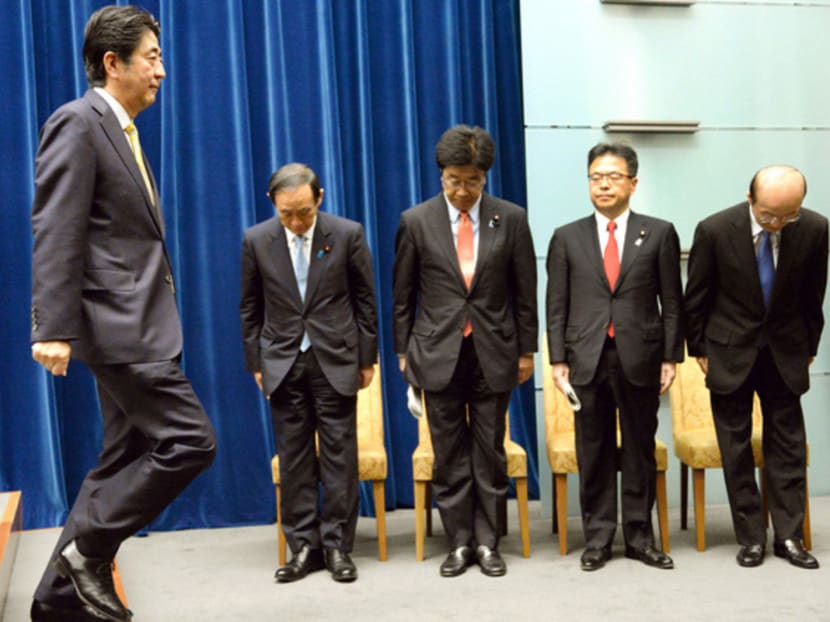China tells Japan: Hiroshima, Nagasaki bombed for a reason
NEW YORK — China is opposing Japan’s proposal to insert language in a United Nations nuclear disarmament conference outcome document inviting world leaders to visit the atomic-bombed cities of Hiroshima and Nagasaki, insisting that it will not allow Tokyo to portray itself as a World War II victim rather than the aggressor.

Japanese Premier Shinzo Abe (left) leaving a press conference at his office in Tokyo on May 15, 2015, after his Cabinet passed the security Bills. Photo: Kyodo
NEW YORK — China is opposing Japan’s proposal to insert language in a United Nations nuclear disarmament conference outcome document inviting world leaders to visit the atomic-bombed cities of Hiroshima and Nagasaki, insisting that it will not allow Tokyo to portray itself as a World War II victim rather than the aggressor.
“We don’t want any mention of Hiroshima (or) Nagasaki because there are reasons why those two (cities) were bombed,” said Chinese Ambassador for Disarmament Affairs Fu Cong.
On the other hand, Japanese officials are attempting to enlist the support of other member states in inserting the language, diplomats said. Representatives from several countries such as Australia have voiced support for the Japanese bid.
Representatives of countries participating in the ninth conference to review UN Nuclear Non-Proliferation Treaty (NPT) are meeting at UN headquarters in New York City.
The call for global leaders and young people to “witness with their own eyes the realities” of the atomic bombings of the two Japanese cities by the United States during World War II was reflected in the first draft of the outcome document, released on May 8.
The invitation, which was first brought up by Japanese Foreign Minister Fumio Kishida, was dropped from a subsequent draft of the outcome document earlier this week after China voiced its strong opposition to the language.
Mr Kishida on Wednesday pushed hard for the inclusion of the invitation in the outcome document, saying that the proposal “is very important in generating momentum toward realising a world free of nuclear weapons”.
In response to the language being dropped, China’s Foreign Ministry expressed that Mr Fu has already made “clear elaboration” on the issue.
“It is hoped that all parties would take a reasonable, pragmatic and collaborative view on handling relevant issues, and avoid drawing complicated and sensitive factors into this,” ministry spokeswoman Hua Chunying said at a regular news conference on Wednesday.
When asked whether Chinese leaders had any plans to visit Hiroshima and Nagasaki, Ms Hua replied, “Let me ask first: When will Japanese leaders come to China and visit the memorial hall of victims in the Nanjing massacre?”
Discussions have taken place between China and Japan on a bilateral basis at the sidelines of the conference.
Japan is believed to have asked for China’s understanding on the issue.
As China is unlikely to back down on its stand, it remains to be seen whether the call for the visits will be restored in the run-up to the conclusion of the conference on May 22. AGENCIES






